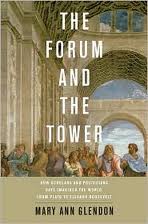[by J. Scott Shipman]

The Forum and The Tower by Mary Ann Glendon
“The relationship between politics and the academy has been marked by mutual fascination and wariness since the time of Plato.”
The first sentence on the flap of the dust jacket of this very good and informative small book. Professor Glendon, who is the Learned Hand Professor of Law at Harvard Law school, set out to write a book for her students that would answer ageless questions such as:
“Is politics such a dirty business, or are conditions so unfavorable, that couldn’t make a difference? What kinds of compromises can one make for the sake of getting and keeping a position from which one might be able to have influence on the course of events? What kinds of compromises can one make for the sake of achieving a higher political goal? When does prudent accommodation become pandering? When should one speak truth to power no matter what the risk, and when is it acceptable, as Burke put it, to speak the truth with measure that one may speak it longer? When does one reach the point at which one concludes, as Plato finally did, that circumstances are so unfavorable that only the reasonable course of action is to “keep quiet and offer up prayers for one’s own welfare and for that of one’s country”?”
Professor Glendon answers these questions and more through brief examinations of the lives and works of some of history’s most important figures:
Plato
Cicero
Justinian, Tribonian, and Irnerius
Machiavelli
Thomas Hobbs and Edward Coke
John Locke
Jean-Jacques Rousseau
Edmund Burke
Tocqueville
Max Weber
Oliver Wendell Holmes
Eleanor Roosevelt and Charles Malik
All in all, I believe Professor Glendon has provided a uniquely valuable book to help her students and other readers to answers those questions. In short but focused chapters of about 20 pages each, she provides mini-biographies of the subjects above and how they answered the some of the questions both in their lives and in their philosophy. Some of her subjects were thinkers lacking the abilities for the public square, Plato, for instance, but were enormously influential just the same. Rare were those like Cicero and Burke who were equally comfortable in the political arena or the academy.
My favorite chapters were on Plato, Cicero, Machiavelli, and Burke—mostly because I’ve read a respectable amount of their work. That said, I have not read Plato’s The Laws—and Professor Glendon suggests it is much better than The Republic—which I have read and did not much enjoy. Not surprisingly, The Laws will be on my list for this winter.
The inclusion of Eleanor Roosevelt and Charles Malik was something of a surprise, but Professor Glendon is weaving a sub-story through each chapter and illustrating how Roosevelt and Malik’s work on the Universal Declaration of Human Rights was something of culmination and extension of over 2,000 years of thinking and political action—not in the context of human progress towards a utopia of sorts, which she wisely rejects, but rather a reflection the common threads of political thought throughout history.
While this is not criticism, I would have liked to have seen a chapter on John Adams and Thomas Jefferson, and a chapter on Karl Marx, whom she frequently mentions.
This is a book that is approachable and readable, and in our tumultuous domestic and global political climate, important.
She closes with this illuminating sentence:
“If one message emerges from the stories collected here, it is that just because one does not see the results of one’s best efforts in one’s own lifetime does not mean those efforts were in vain.”
Professor Glendon is to be commended for a job “well done!”
The book comes with my highest recommendation and may be the best book I’ve read this calendar year. Add this book to your must read list.
.
Referenced works you may find of interest (some of these works are out of print and expensive—for simplicity I’ve used Amazon links):
The Laws of Plato, translated by Thomas Pangle
Cicero: The Life and Times of Rome’s Greatest Politician, by Anthony Everitt
Cicero, A Portrait, by Elizabeth Rawson (Glendon praised this book.)
A Panorama of the World’s Legal Systems, John Henry Wigmore
The Life of Nicolo Machiavelli, Roberto Ridolfi
The Prince, translated by Harvy Mansfield
Machiavelli, by Quentin Skinner
The Lion and the Throne, Catherine Drinker Bowen
The Spirit of Modern Republicanism, by Thomas Pangle
Statesmanship and Party Government, by Harvy Mansfield
The Great Melody, A Thematic biography of Edmund Burke, by Conor Cruise O’Brien (I read this wonderful book in 1992 when it was released: highly recommended.)









